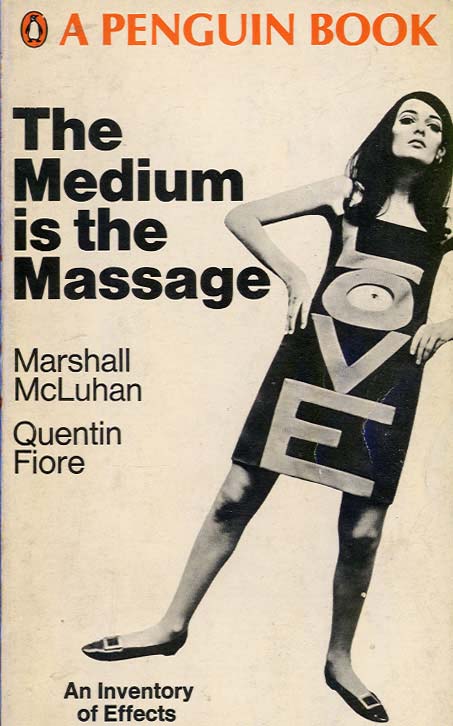Two passages from Marshall McLuhan in the 1960s, which wondered about the new reality for privacy, connectedness, printed matter and jobs.
____________________________
From The Medium Is The Massage: An Inventory of Effects:
How much do you make? Have you ever contemplated suicide? Are you now or have you ever been…? I have here before me…Electrical information devices for universal, tyrannical womb-to-tomb surveillance are causing a very serious dilemma between our claim to privacy and the community’s need to know. The older, traditional ideas of private, isolated thoughts and actions–the patterns of mechanistic technologies–are very seriously threatened by new methods of instantaneous electric information retrieval by the electrically computerized dossier bank–that one big gossip column that is unforgiving, unforgetful and from which there is no redemption, no erasure of early “mistakes.” We have already reached a point where remedial control, born out of knowledge of media and their total effects on all of us, must be exerted. How shall the new environment be programmed now that we have become so involved with each other, now that all of us have become the unwitting work force for social change? What’s that buzzzzzzzzzzzzzzzzzzzzzzzzzzzzzzzzing?•
____________________________
From Jane Howard’s 1966 Life magazine article, “Oracle of the Electric Age“:
No people in the history of humanity, McLuhan insists, ever faced demands as grueling as those that confront us. We are witnessing simultaneously the end of what he calls the Mechanical, or Gutenberg, Era, dominated by movable type and later mechanical forms, and the birth pangs of the new and entirely different Electric Age, which he sometimes calls the Age of Circuitry, or of Information. As his books The Gutenberg Galaxy and Understanding Media explain, the change is the most traumatic since the transition 9,000 years ago, from the paleolithic culture to the neolithic, from hunting to agriculture.
The change, says McLuhan, is making movable type obsolete and with it books, newspapers, magazines–in fact all kinds of printed matter, including the sentence you are now reading. We will also have to junk the by-products of the Gutenberg invention which, says, McLuhan, have created our culture’s visual, literary, detached, linear approach to life. This dooms a lot more linear by-products than you might think, including railways, clotheslines, stocking seams, the grid system in city planning and stag lines at dances. Even points of view must go–”because it’s no longer possible to take a fixed position for more than a single moment.” So must jobs, which are fragmentary in nature and do not suit the new age in which people crave roles with depth involvement.•

